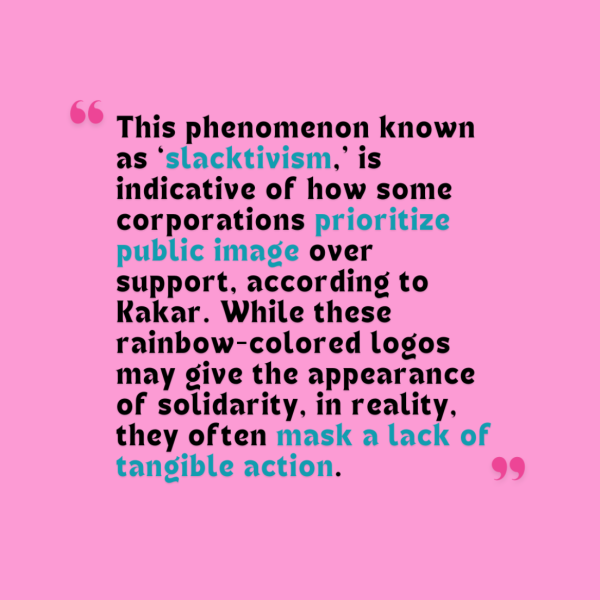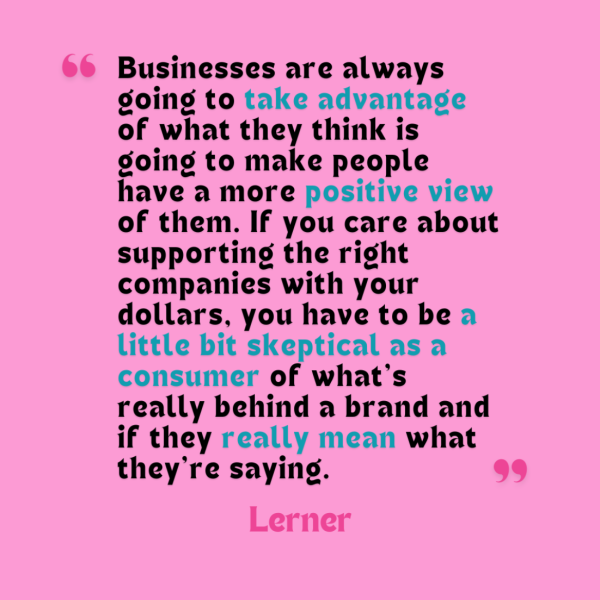In 2023, Target faced serious backlash after anti-LGBTQ+ riots targeted their recently released pride collection. At one store in Columbus, Ohio, neo-Nazis carried swastika flags and shouted hateful chants while displaying a banner that read, “There will be blood.” To appease these violent protesters, Target removed some of the clothing that generated controversy among protesters, a response that received criticism for conveying that the LGBTQ+ pride collection was simply a business transaction rather than a show of solidarity.
This problem is not unique to Target: “pinkwashing” is defined as a marketing strategy typically used by large corporations to appeal to the LGBTQ+ community without actually committing to its values. According to junior and Gender Sexuality Alliance Vice President Archana Kakar, by releasing poor-quality pride merchandise and posting about pride on social media to raise engagement, brands have proven that their so-called support is more about the profit than the principle.
In addition to Target, H&M and Forever 21 have utilized pinkwashing in the past. In 2021, H&M announced that they would be releasing a ‘Beyond the Rainbow’ collection and donating $100,000 to the United Nations Free & Equal Campaign. However, they were not fully transparent about how much they would profit off of the collection prior to the campaign. The company made over $1.5 billion from the campaign in 2021 alone, making their donation less than 0.001% of their overall profit. Pinkwashing through menial efforts to support the LGBTQ+ community, according to Kakar, indicate that the priorities of these organizations lie in profit.
“It just looks like businesses put something out for the sake of putting something out and not like they put any thought into it,” Kakar said. “It makes you feel like they’re just using it for marketing and don’t actually care about the history of the LGBTQ+ community. They just want more money. As a part of the LGBTQ+ community, we are not just your marketing helpers, we’re people.”
This trend of supporting pride simply for the exposure is especially apparent during Pride Month, dedicated to the celebration of all the LGBTQ+ community has fought for and the milestones they have achieved. According to junior Megan Yang, Pride Month has turned into a commercial holiday for businesses to profit off of via merch and social media promotions.

“Making things rainbow doesn’t do much to put out a statement,” Yang said. “They change their logos to rainbow, they make things more colorful, maybe they put out some products that are related to pride. But that’s definitely more marketing than actually supporting the LGBTQ+ community.”
When looking at some of the products companies have put out in attempts to present themselves as allies, Kakar says corporations equate activism with a limited time sale on rainbow-colored clothing, which can backfire when their effort is minimal. This phenomenon, known as “slacktivism,” is indicative of how some corporations prioritize public image over support, according to Kakar. Biology and physiology teacher Lora Lerner agrees with this sentiment, calling for consistent efforts that are beyond just performative support.
“It’s more than just having a booth at the Pride Parade,” Lerner said. “These companies need to actually be supporting the LGBTQ+ community and not having policies or even be supporting politicians and political movements that are not supportive of the LGBTQ+ community.”
However, according to Yang, amidst the criticism of corporate pride, it is important to recognize that
there are still businesses that authentically represent and support the LGBTQ+ community. She recalls smaller brands and somequietly supportiveorganizations that maintain inclusivity year-round, not just when it’s profitable and trendy. These companies donate and back initiatives that advocate for the LGBTQ+ community, such as the nonprofit organization GLAAD, to raise the voices of marginalized groups.
To navigate the blurry line between genuine support and opportunism, Lerner supports turning to independent organizations or watchdog groups that track corporate practices. However, beyond reliance on statistics and outside information, Lerner also recognizes the importance of skepticism and raises the question: “Are these corporations genuinely committed to the causes they claim to champion, or are they simply leveraging social issues such as pride for profit?”
 “Businesses are always going to take advantage of what they think is going to make people have a more positive view of them,” Lerner said. “If you care about supporting the right companies with your dollars, you have to be a little bit skeptical as a consumer of what’s really behind a brand and if they really mean what they’re saying.”
“Businesses are always going to take advantage of what they think is going to make people have a more positive view of them,” Lerner said. “If you care about supporting the right companies with your dollars, you have to be a little bit skeptical as a consumer of what’s really behind a brand and if they really mean what they’re saying.”
However, Lerner says that it’s important to recognize that pride has become so much more in the past decade, and she notices society is moving in a positive direction where it is no longer considered unwelcome to voice support for the LGBTQ+ community, and that pinkwashing means that companies are at least willing to show support, even if it is a pretense.
“It wasn’t that long ago that having a pride parade was a dangerous thing to do,” Lerner said. “The police had to guard people in the parade because there might be violence and right now, the police are there to keep the crowds down. Now corporations have jumped into that. Of course, that might be somewhat self-serving, but it’s a pretty strong statement that society has made that leap where it’s not controversial or dangerous anymore to be supportive.”





































